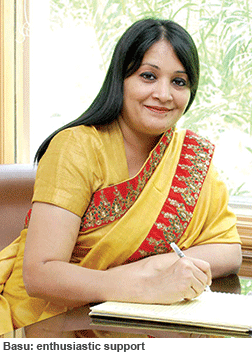WITH THREE PROMINENT Trinamool Congress (TMC) leaders behind bars for their alleged involvement in the Saradha scam — in which an estimated Rs.20,000 crore was misappropriated by the Saradha Group, a consortium of over 200 private companies managed by financier Sudipto Sen — and increasing lawlessness arising out of frequent inter-party conflicts over political turf, West Bengal chief minister Mamata Banerjee is losing friends and influence rapidly. Amidst growing public anger and disenchantment with the ruling party, Banerjee is trying to steady the ship of state and steer the TMC through stormy and turbulent waters.
 In the circumstances, the announcement on December 3 of Apollo Hospitals Enterprise Ltd, one of the largest integrated healthcare corporates in India, that it intends to construct a new 1,000-bed teaching hospital in Kolkata with an investment of Rs.400 crore, has come as a morale booster, particularly since the company has already established a 600-bed multi-specialty tertiary care hospital named Apollo Gleneagles in the city. The announcement came two days after the Union railway ministry dropped a proposal made by Banerjee way back in 2009, when she was the Union railway minister in the Congress-led UPA I government, to promote medical colleges with government (railway) hospitals and private partners.
In the circumstances, the announcement on December 3 of Apollo Hospitals Enterprise Ltd, one of the largest integrated healthcare corporates in India, that it intends to construct a new 1,000-bed teaching hospital in Kolkata with an investment of Rs.400 crore, has come as a morale booster, particularly since the company has already established a 600-bed multi-specialty tertiary care hospital named Apollo Gleneagles in the city. The announcement came two days after the Union railway ministry dropped a proposal made by Banerjee way back in 2009, when she was the Union railway minister in the Congress-led UPA I government, to promote medical colleges with government (railway) hospitals and private partners.
A 14-acre plot in Hiland Riverside in Batanagar (South 24 Parganas district) has been provided free of charge by the state government for the Apollo Institute of Medical Sciences and Research, scheduled to be up and running by 2020. “The state government is very supportive and enthusiastic about this initiative. Initially, it offered us four acres to build a hospital in a new township being built in that area. But when we presented a proposal to build a medical college as well, and requested a larger land grant for the purpose, the state government immediately agreed, as there is a need for more medical colleges in the state,” Rupali Basu, chief executive (eastern region) of Apollo Hospitals informed a media conference held in Kolkata on December 3.
According to Basu, the first phase of the institute with 500 beds for patients and 100 seats for medical students, is scheduled to be operational by 2017 and the super specialty hospital with 1,000 beds and 150 medical seats by 2020. This will be Apollo Hospital’s second medical college after the one already operational in Hyderabad (estb. 2012). Besides the regular MBBS degree programme, it will offer 18 other undergraduate and postgraduate courses in nursing, pathology, hospital management plus a health resource skill centre. When fully completed, the Apollo Institute of Medical Sciences, Kolkata will create employment for 5,000 people including doctors, nurses and supplementary staff.
“Currently the great majority of medical students who leave West Bengal to study medicine in other states or abroad, never return.
Lack of capacity, pathetic infrastructure and poor quality of medical education have contributed to this continuous brain drain. With hi-tech corporates such as Apollo getting into healthcare, students will now get the opportunity to study medicine under the guidance of experienced doctors from across the country and abroad. Moreover the new Apollo Institute will also be a hub of research enabling students to engage in meaningful R&D,” says Dr. Survo Banerjee, senior cardiologist at the Apollo Gleneagles Hospital, Kolkata.
For West Bengal’s beleaguered chief minister and the TMC reeling under a spate of charges of wrong-doing related to the Saradha scandal, Apollo’s implicit endorsement of the state as a safe investment destination in undoubtedly a welcome Christmas present.
Baishali Mukherjee (Kolkata)